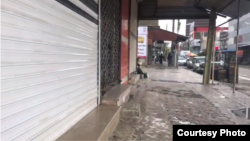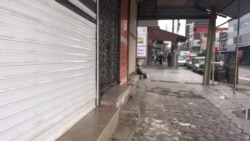Divisions have emerged within Iran’s Kurdistan province about how to pressure Tehran to stop blocking border footpaths used by residents to trade with fellow Kurds in Iraq.
Iranian Kurdish activists who contacted VOA Persian from the region via social media said shopkeepers were back at work on Monday in seven towns where most had been on strike the previous week to protest the Iranian government’s border blockade. The activists said the workers in those areas wanted to give Iranian authorities several weeks to follow up on pledges to address their grievances.
Residents reported shops re-opening on Sunday in Javanrud, Mahabad, Saqqez, Sardasht and Sarpol Zahab, and on Monday in Marivan and Piranshahr. Workers in the seven towns had progressively joined the strike that began in Javanrud and the city of Baneh on April 15.
But activists said shopkeepers in Baneh extended their strike into a ninth day on Monday after rejecting government appeals to return to work. Baneh’s economy is more reliant than the other areas on porters, known as kolbars, importing goods from Iraqi Kurdistan via the blocked border footpaths.
WATCH: Shops closed in protest
Iranian state media said Interior Minister Abdolreza Rahmani Falzi discussed the concerns of Iranian Kurdish border traders at a meeting in Tehran on Monday and pledged to come up with solutions. Activists in the region said shopkeepers were threatening to resume their strikes in three weeks unless the border footpaths are re-opened by then.
This report was produced in collaboration with VOA’s Persian Service. Michael Lipin contributed additional reporting from Washington.






